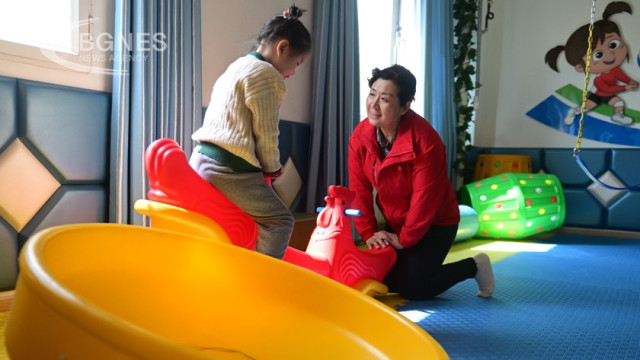Shoko Sakuma says that working in accounting was difficult for her, but now she is using her childhood love of drawing in her new workplace.
This innovative initiative aims to provide vocational training and confidence to people with autism who struggle to cope in the Japanese work environment, which is often full of high stress and long working hours.
"I was very bad at numbers, which was the first thing that bothered me," Sakuma said at Shake Hands, her workplace since last year in Kyoto, western Japan.
"I was losing things... Clients' things that are very important and that you should never lose," the 39-year-old woman told AFP.
With attention deficit hyperactivity disorder (ADHD) and autism spectrum disorder (ASD), Sakuma explained that she had trouble concentrating on accounting and eventually developed bipolar disorder. Sometimes she couldn't leave her house. Now she spends her work days at a partitioned desk - which helps her focus - adding digital effects to anime footage.
"With my personality, I can't go to the next step if I don't understand every detail well. The teachers here accept who I am and teach me in a very delicate way. I feel at ease here. I have fun," she stated.
More awareness
For a long time in Japan, developmental disabilities such as autistic disorder were considered a matter of personality, but research has helped raise public awareness and change public policy.
In 2004, Japan passed a law recognizing disorders such as autism, attention deficit hyperactivity disorder (ADHD), and learning disabilities. The country obliges schools to identify and support children in need of special care.
Tokyo also expanded the scope of the so-called type "B" facilities - workplaces that previously catered only to individuals with conditions such as Down's syndrome. Now these institutions number about 16,000.
Instructor Yuki Kawai noted that obstacles in other environments can be an advantage in animation: "An animation is built on the basis of a so-called time sheet - a plan that commands every movement of the characters."
"There are no abstract rules in creating animations ... which is easy for people like us to understand," he said.
"terrible accident"
Kawai himself was diagnosed with ADHD after graduating from art and design school and a "terrible accident" at his first sales job.
"I often couldn't get up in the morning or I couldn't get to the office on time. I couldn't handle phone calls because many times I couldn't spell the person's name correctly," he explained.
Such an experience can cause mental health problems for people with autism, says Yuji Umenaga, a Waseda University professor and specialist in mental health and learning disabilities.
"A lot of people who come to me show symptoms of depression," he said, adding that some people with autism become depressed because their symptoms make it difficult to work.
"Antidepressants do not work for them, because in the case of autism, the trigger is his symptoms, which make relations with bosses and colleagues difficult," the professor pointed out.
"Great potential"
Shake Hands has provided animation scenes for several hit movies and won a commission from a Malaysian company to create an anime commercial.
Upbeat music plays in the studio to keep the 10 or so employees comfortable.
"In a quiet environment, some people are sensitive to other people's conversations because they think they can be the subject of their conversations," said Momoka Tsuji, a staff member.
Workers, who are paid a nominal wage, are reminded to take hourly breaks, and people can start and stop whenever they want, even late at night.
"Some of our colleagues don't feel comfortable talking directly, so we communicate through an intranet chat function," said Tomoya Sawada, 34, head of the animation studio.
Professor Umenaga hopes that Shake Hands will inspire other initiatives along the lines of Exceptional Minds, an American animation studio in Hollywood that provides vocational training for autistic students.
"To help their wonderful potential to shine, we need to provide them with an appropriate environment - from childhood education to professional training," the professor emphasized. /BGNES







